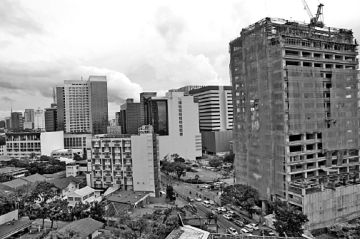‘Dutertenomics’ seen to drive more investments in Cebu

INFRASTRUCTURES BOOM. Cebu is seeing a tremendous private sector-led infrastructure growth, as seen by these new high-rise buildings being constructed in Cebu City in this photo taken on November 18, 2016. The Duterte administrations now aims to also engage in massive government infrastructure projects.
CDN FILE PHOTO
The Duterte administration’s thrust to ramp up public spending on infrastructure was seen to drive private sector investments in the country, a local investment promotions official said.
This, in particular, was a key in spreading development to rural areas still unreached by investments.
“Infrastructure will really help, especially those that will improve the mobility of goods and services,” Board of Investments (BoI)
Cebu extension office OIC Ellorence Cruz told reporters on Wednesday.
During the “Dutertenomics” forum on Tuesday, government officials said the administration planned to roll out more than P3.6 trillion in public infrastructure projects from 2018 to 2020.
This was seen to usher in the “golden age of infrastructure” in the Philippines, officials said.
Cruz said that for 2017, they expect more investments to be registered with their office in Cebu City and province as there have been many inquiries about the registration process since the start of the year.
The value of BoI-registered projects in Cebu, however, dropped to P720.58 million in the first quarter of 2017 from P7.65 billion during the same period in 2016.
Projects logged with BoI as of March this year include two mass housing projects by 77 Living Spaces, Inc. (Malibu by Aldea Premier in Talisay City) and Kenrich Development Corporation (Villa Melissa in Liloan) as well as three small-scale solar power projects by Solar Pacific Citysun Corporation in Cebu City and Consolacion town.
In the first quarter of 2016, a P6.6 billion wind power project by Amihan Energy Corporation in Balamban town in midwestern Cebu was registered with the BoI, making it one of the highest-costing activities logged during that year.
All five projects in the first quarter of 2017 were seen to generate 234 jobs, still lower than the 498 jobs generated from six projects in the first quarter of 2016.
While the value of projects registered with the BoI by far this year is lower than that of last year, Cruz said this was not necessarily negative.
“We just cannot predict projects to be registered,” she said.
Boost for ‘less-developed areas’
Less-developed areas in the provinces were also seen to get a boost from the new Investment Priorities Plan (IPP) 2017-2022 in which the BoI has declared additional places where investors can get more incentives compared to locating in more developed sites.
Among those identified in the old IPP were the towns of Pilar and Tudela on Camotes Islands, Ginatilan, Malabuyoc, Ronda, and Samboan.
The new IPP now included Bogo City, Borbon, Daanbantayan, Madridejos, Medellin, Poro and San Francisco on Camotes Islands, San Remigio, Bantayan and Sta. Fe on Bantayan Island, Tabogon, Tabuelan, and Tuburan.
The areas were determined by the National Economic and Development Authority (Neda) based on the local gross domestic product, employment versus unemployment rates, as well as level of infrastructure investment, among others.
When investors are pioneers in a “less-developed area,” they are entitled to two more years in the supposed four-year tax holiday, Cruz explained.
However, she emphasized that local government units need to be prepared.
“Local government units need to identify what their strengths are as a location as well as the opportunities and industries appropriate to the locality,” said Cruz.
She also said that in order for places to be attractive to investors, these should be investor-friendly and conducive to business, adding that infrastructure development will play a crucial role in all of these.
Investment code
The BoI has partnered with the Cebu Provincial Investment Promotions Office (CIPO) to help towns and cities, especially those in the list of “less-developed areas,” to come up with an investment code as well as to capacitate the local economic investment promotions officer.
Cruz said they are striving to encourage companies, especially those that have high impact on employment such as manufacturing, to register for BoI incentives.
The BoI, an attached office of the Department of Trade and Industry (DTI), is the government’s main investment arm that registers projects qualified for fiscal and non-fiscal incentives such as, but not limited to, tax holidays, duty-free importation of capital equipment, and employment of foreign nationals.
Disclaimer: The comments uploaded on this site do not necessarily represent or reflect the views of management and owner of Cebudailynews. We reserve the right to exclude comments that we deem to be inconsistent with our editorial standards.
